- Home
- J. T. Edson
Get Urrea! (An Ole Devil Hardin Western Book 5) Page 4
Get Urrea! (An Ole Devil Hardin Western Book 5) Read online
Page 4
To his face, Gomez’s comrades-in-arms addressed him as ‘Bravio’, ‘Ferocious’, and ‘Espantoso’, meaning ‘Fearful’ or ‘Terrible’, any of which applied in full measure to his nature. They called him ‘Yaqui’ too, but only behind his back, and whispered stories of what had happened to a soldier who was foolish enough to make use of that nickname in his hearing.
Slightly over medium height, Gomez had a thickset body that bore not a surplus ounce of fat. On the few occasions when he allowed his hair to grow beyond its usual very close-cropped state, it was black and straight. This combined with his. dark coppery-red features, high cheekbones, slightly slanting brown eyes, a tight lipped mouth that rarely smiled and a broad, wide nostrilled nose was suggestive of Indian blood. Although his parentage was known, there were few who were unwise enough to mention it. Those who did never made the mistake a second time. He was as deadly and quick to kill as the man who sired him by raping his mother, a warrior of the tribe which gave him his third and least used sobriquet.
‘Wha—What happened?’ Badillo gasped, as his head cleared and he looked around. Seeing his men involved in the fighting, he tried to rise.
‘Take it easy, sir,’ Gomez advised, gently restraining the officer. ‘One of these infantry bastards shot your horse and you took a bad fall. Is anything broken?’
‘I don’t think so,’ Badillo decided, after moving his arms and legs. There was a certain amount of pain, but nothing to suggest that bones had been broken. ‘Help me up and—’
‘If you’ll be advised by me, sir,’ the sergeant major said politely, feeling the major swaying after he had obeyed the order. ‘You’ll stay here and let the men finish off the Texians.’
Much as Badillo would have like to become involved in the fighting, if only so that he could try to kill Saucedo, he could see the objections to it. He had sufficient respect for the fighting qualities of individual Texians (although he had small regard for them as an organized whole) to realize that he would need all his faculties working at their highest pitch in order to tangle with such desperate men. Still feeling the effects of being flung to the ground, he knew he would be unable to react with his customary speed.
‘You’re right,’ the major conceded, weaving from side to side and feeling Gomez’s arm tighten in support. ‘I’d better sit down.’
Keeping an eye on the struggling mass of men and holding himself ready to defend Badillo if necessary, the sergeant major helped him to reach and sit on the dead horse’s saddle. The officer turned his gaze to the wound in the animal’s shoulder. Despite Gomez’s earlier explanation, it was not until then that a full understanding of what had happened began to penetrate Badillo’s head.
‘Did you see who did this?’ Badillo snarled, indicating the bullet hole.
‘No,’ Gomez confessed. ‘By the time I looked, most of them were reloading.’ Then, realizing what the question implied, he glared up the slope and went on, ‘Do you think it might have been done deliberately?’
‘I don’t know,’ the major replied, thinking about his own plans with regard to his rival. ‘They are supposed to be the best shots in Saucedo’s Battalion and a Baker’s a damned accurate rifle.’
While Badillo was speaking, he stiffly and painfully twisted his torso and stared behind him. Standing protectively at his side, Gomez—who was armed with a saber instead of a lance and had a pistol thrust into the opposite side of his weapon belt—also studied the slope. However, they had left it too late.
Refugio had noticed the sergeant major’s earlier examination of the area and had taken warning from it. Discarding his notions of making a second attempt to earn his promotion, he had moved from his position. By the time he was once more under Gomez’s observation, he was standing between the nearest pair of his men and staring at the fighting on the trail with unswerving attention.
‘It could have been any of them,’ Gomez growled, having forgotten where the sergeant had been the last time he looked. ‘They all know that Saucedo hates your guts and would be pleased to see you dead.’
‘Knowing it and trying to do something about it are two different things,’ Badillo pointed out. ‘There aren’t many who’d think of it, or be willing to take a chance on doing it if they did. What kind of man is that sergeant?’
‘Stupid, from what I’ve seen of him,’ Gomez answered. ‘But they say there’s not a finer shot in the Battalion. I don’t think he’d be smart enough to come up with the idea of killing you and making it look like it was accidental.’
‘Saucedo could have told him to do it if he saw the chance,’ the major countered, then swung an angry scowl towards the fighting. ‘Damn it! If I could only get in among them—!’
‘Nobody could blame you for not going, sir,’ the sergeant major said soothingly, misunderstanding his superior’s reason for wanting to participate. ‘It was the fault of whoever shot your horse. Anyway, I don’t think they’re going to need our help to settle the Texians. So, if it’s all right with you, I’ll stay here. Just in case there might be more of them who’ve been told to do some “accidental” shooting.’
‘Two pairs of eyes are better than one,’ Badillo admitted. ‘Go and fetch my saber. I might need it if any of them should come this way.’
‘Si, senor,’ Gomez assented.
Keeping a watch on the men among the trees while the sergeant major went to collect his weapon, Badillo drew his pistol from the uppermost of his saddle’s holsters. He noticed that, on completing their reloading, each of the riflemen gave their full attention to the fighting. Even the most logical suspect, Sergeant Refugio, made no attempt to turn his eyes in the major’s direction.
‘Gracias,’ Badillo grunted, accepting the saber with his left hand and spiking its point into the ground. Gesturing with the cocked pistol in his other fist, he continued, ‘Having my horse shot was an understandable mistake. In a fight like that, anybody could be shot by “accident”. I expect it’s happened already and might again.’
‘It might even happen to somebody as important as a colonel,’ Gomez remarked, drawing and cocking his own pistol.
So, while the rest of their companions went on fighting, the major and his faithful subordinate remained where they were. They kept the tangle of human beings and horses under observation, with occasional glances to make sure that none of the men on the slopes were turning a weapon in Badillo’s direction. But despite the pair’s scrutiny of the battle, because Saucedo was always in the thickest of the fighting the chance to kill him did not present itself.
‘Kill them!’ the colonel bellowed, wild with blood lust, swinging his gore-smothered sword at a wounded Texian who was staggering past. The force of the blow almost removed the head from the body of the already dying man. ‘Kill every last one of them.’
For all the desperate efforts of the Texians, the final outcome was inevitable. Rapidly outnumbered, unarmed apart from such weapons as they had been able to snatch from their assailants, within ten minutes the majority of them were either killed or dying.
Finally not one Texian remained on his feet in the valley. Breathing hard from their exertions, the Mexican soldiers were glaring around like fighting bulls who had smelled blood and sought further victims. Some of the more hard-bitten of them set about bayoneting or lancing any wounded that they found. Others, less callous and realizing for the first time exactly what they had been doing, stood silent. A few crossed themselves and took comfort in the thought that their Battalion’s priests would grant them absolution and let them off with a minimal penance.
Despite all the Mexicans’ precautions, several of the Texians had managed to break away from the fighting. Some were shot by the riflemen on the slopes. Others were ridden down and killed by the Lancers. However, there were those who were fortunate enough to avoid either fate. Of the latter, only Dimmock had contrived to obtain a horse. The remainder had fled on foot, making off through the woodland.
While self preservation might have been the basic motive behi
nd most of the escapes, each of the fleeing men had something else in mind. They wanted to spread the news of how Fannin’s command had been betrayed and massacred at Goliad—and to see if there was any way in which revenge could be taken against the man who had ordered it to be carried out, General José Urrea.
Chapter Four – Kill Him Before They Reload!
Although Lieutenant Paul Dimmock managed to land on his hands and knees instead of sprawling flat to the ground, he knew that he could not hope to rise before his pursuers reached him.
Confident that they now had the Texian at their mercy, the six Mexicans were also relieved that the long and grueling chase was almost over. But, foolishly, even though they knew they had left the area which the Tamaulipa Brigade had swept clear of all opposition, only one of them had eyes for anything other than their quarry.
‘Look!’ yelled the man with the badly scratched cheek, some instinct making him glance beyond their proposed victim. As a warning, the single word left much to be desired. It gave no indication of where he wanted to direct his companions’ attention. Realizing its shortcomings, he supplemented it. ‘Up there, by the trees!’
Catching the note of alarm in the Lancer’s voice, the sergeant looked up. What he saw gave him as great a shock as it had the speaker.
Three armed men were running from the grove of post oaks.
Apparently they had emerged from concealment even before the Texian had fallen down, but had gone unnoticed by the Mexicans who had been too excited and engrossed in the prospect of catching and killing their victim.
Only one glance was needed for the sergeant to decide that the newcomers were unlikely to be friendly and had not come out of hiding to help capture, or kill, the man they were pursuing.
Two of the men were dressed in such a similar fashion that they might have been wearing some kind of uniform. Each had on a low-crowned, wide-brimmed black hat, a fringed buckskin shirt, a pair of tight fitting fawn riding breeches and black Hessian boots. vii In addition to the rifles in their hands, both carried a pistol on the right side of the waist belt and a massive, white handled knife—presumably of the kind already known, even to Mexicans, as a ‘bowie’, in honor of the man credited with designing the original weapon viii —sheathed at the left. There was only one noticeable difference in the pair’s attire. The taller and bulkier man’s tightly rolled bandana was scarlet, while his companion sported one of a multi-hued riot of clashing colors.
In some ways, the third member of the party was even more remarkable than his companions. Much shorter, not more than five foot six, he was bare headed and had close cropped black hair. His face was an almond color, with slanted eyes and cheerful features that did not appear to be either Mexican or Anglo-Saxon. A loose fitting black shirt hung outside somewhat baggy trousers of the same material which were tucked into Hessian boots. Unlike his companions, he had no firearms. Instead, a pair of long hilted, slightly curved swords—the one on the right being some inches shorter than its mate at the left—swung from slings attached to his leather waist belt. He held a six-foot long bow with an arrow nocked to its string. If the Mexicans had been more observant, they might have noticed that its handle was set two thirds of the way down the stave instead of centrally. There was a quiver suspended across his back, so that the flights of the arrows it held rose over his right shoulder and were readily accessible to his ‘draw’ hand.
Despite the rifles held by the two taller of the newcomers, the sergeant and his party felt little anxiety. In fact, the alarm in the voice of the man with the scratched face had been caused more by surprise than fear. Nothing they had seen of Texians so far, either at San Patricio or Goliad, had led them to form a healthy respect for the rebels’ fighting qualities. At neither place had they shown to any great advantage.
There was something that the Lancers were failing to take into account. At San Patricio, the men opposing them had been an undisciplined and disaffected rabble who were the remains of the force with which—against Houston’s orders—the adventurer, Colonel Frank Johnson, had planned to attack and loot Matamoros. The troops at Goliad had already lost all faith in their commanding officer and were demoralized before they had been surrounded by the vastly superior numbers of the Tamaulipa Brigade.
If the six Mexicans had fought at San’ Antonio de Bexar, either in December the previous year ix or during the siege of the Alamo Mission, they would not have been so disdainful of Texians’ fighting prowess.
Nor did the Lancers consider that the three men would be able to prevent them from killing the Texian. Even though they had the greater distance to cover before reaching him, their horses were carrying them much faster than the trio could run.
The same thought obviously occurred to the newcomers. However, their solution to the problem did not appeal to be the wisest to the racing Mexicans. But, it was what the Lancers expected of Texians.
Coming to a halt, the two taller men raised their rifles. The other, strange looking, man, clearly considering that he was at a distance where his weapon would not prove effective, continued to advance. However, he took care not to come between his companions and the Lancers.
Having sighted, the two men squeezed their triggers practically in unison. Flame and white smoke lunged from the muzzles of the rifles. Back snapped the head of the Mexican who had drawn ahead of his companions and his shako spun upwards from it. Letting his lance drop, he slid limply from his saddle and followed the weapon to the ground. Although the sergeant had also been singled out for attention, he was more fortunate. He too lost his headdress, the bullet merely removed it by striking the badge and not ripping through his skull.
A hard-bitten veteran, the non-com was still startled by the narrow escape. Involuntarily he drew back on his horse’s reins with a snatch that caused it to slacken its already leg-weary gait. The pause allowed his companions to draw ahead of him. However, he recovered his nerve quickly enough and encouraged his mount to increase its speed. Studying the two newcomers, he concluded that the worst of the danger was over. The rifles were now empty and there was no time for them to be made ready for use again. In all probability, the men would drop them and try to continue the fight with the pistols. To his way of thinking, the handguns posed much less of a threat than the rifles.
‘Keep going!’ the sergeant bellowed, noticing that some of his Lancers were looking back at him and showing signs of perturbation. ‘We can kill him before they reload.’
Raising his head as he heard the shots, Dimmock stared at his rescuers through eyes half blinded by sweat. What he saw caused him to experience a momentary surge of relief. Not only did he recognize the two men’s attire as that of the Texas Light Cavalry, but he felt sure that he could name both of them.
Six foot tall, the man on the right was heavily built and conveyed an impression of well-padded lethargy. Curly, auburn hair showed from beneath his hat. Despite the gravity of the situation, his sun-reddened features retained something of an amiable and almost sleepy expression. Unless Dimmock was mistaken, his name was Mannen Blaze.
Matching his companion in height, the second man’s straight-backed, whipcord lean frame—set off to its best advantage by the well-tailored garments—made him appear slightly shorter. He had black hair, but it was his face that supplied the clue to his identity. Brows like inverted ‘V’s’ over coal black eyes, an aquiline nose, a neatly trimmed mustache and a short, sharp pointed chin beard gave the features an almost Satanic cast which, in part, accounted for why Captain Jackson Baines Hardin was nicknamed ‘Ole Devil’. x
As the third member of the rescue party was advancing outside the lieutenant’s range of vision, which was restricted by perspiration and exhaustion, the two young men—neither had yet reached twenty-six years of age—appeared to be alone and to have no other assistance.
Nor did they seem to have a very clear grasp of the situation!
The smoke that was still curling away from the muzzles proved that each of the newcomers had fired his singl
e barrelled rifle. So Dimmock duplicated the Mexican sergeant’s line of reasoning on what they would do next.
Much to the lieutenant’s consternation, the pair made no attempt to do either of the things which he and the non-com were anticipating.
It was almost as if Dimmock’s would-be rescuers were unaware that they now held empty weapons. They neither dropped the rifles as a prelude to drawing their pistols, nor lowered the butts in preparation to start reloading.
Dimmock found the pair’s lack of activity puzzling to say the least. Although he had never met them, he knew something of Ole Devil Hardin and Mannen Blaze. They had already begun to earn themselves reputations for being fighting men of the first water. It was said that they were courageous without being reckless, overconfident or foolhardy and possessed considerable knowledge where the handling of weapons was concerned. In the latter case particularly, the lieutenant felt that they were not living up to their reputations. He wondered if, having rushed into their present predicament without taking the odds against them into account, they were now frozen into immobility with fright.
If Dimmock had been less exhausted and emotionally disturbed, he might have noticed certain things about the two Texians’ weapons; although, even if he had, it was improbable he would have appreciated what it meant. At first glance, the rifles which were still at their shoulders seemed to be ordinary enough. However, even a casual closer look would have disclosed a few small differences and one major one. Not only did Dimmock fail to detect the unusual aspects, but certain small movements being made by his rescuers also escaped his observation.
The sergeant and the four remaining Lancers were no better informed, nor more observant. They were still too far away to see the less obvious aspects of what was happening. Even if they had been closer, they too were unlikely to have appreciated the point of the Texians’ right thumbs manipulating a small lever on the side of their rifles’ frames.

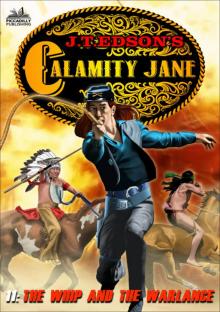 Calamity Jane 11
Calamity Jane 11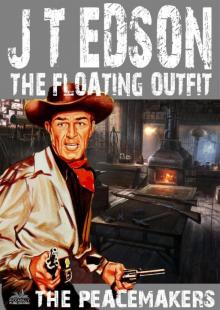 The Floating Outift 33
The Floating Outift 33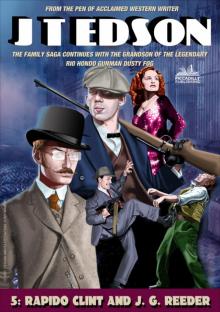 Cap Fog 5
Cap Fog 5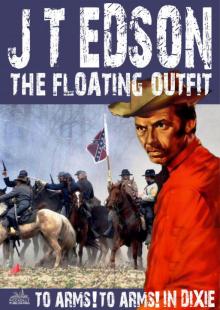 The Floating Outfit 34
The Floating Outfit 34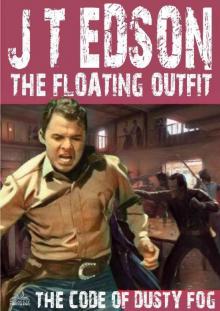 The Code of Dusty Fog
The Code of Dusty Fog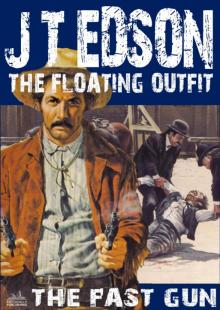 The Floating Outfit 21
The Floating Outfit 21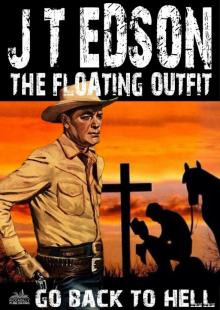 The Floating Outift 36
The Floating Outift 36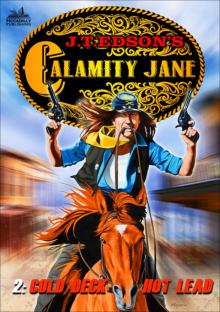 Calamity Jane 2
Calamity Jane 2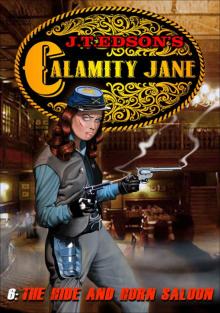 Calamity Jane 6: The Hide and Horn Saloon (A Calamity Jane Western)
Calamity Jane 6: The Hide and Horn Saloon (A Calamity Jane Western)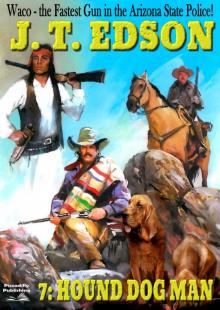 Waco 7
Waco 7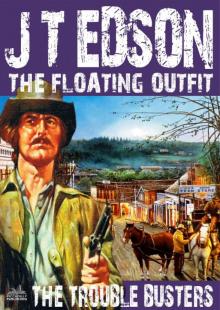 The Floating Outfit 25
The Floating Outfit 25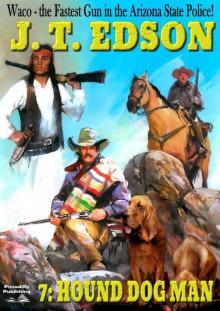 Waco 7: Hound Dog Man (A Waco Western)
Waco 7: Hound Dog Man (A Waco Western)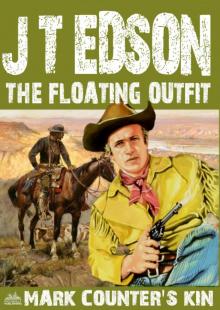 The Floating Outfit 47
The Floating Outfit 47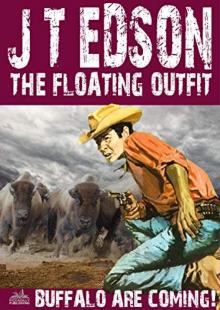 The Floating Outfit 42: Buffalo Are Coming!
The Floating Outfit 42: Buffalo Are Coming!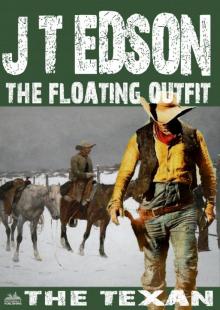 The Floating Outfit 46
The Floating Outfit 46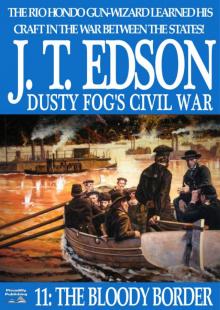 Dusty Fog's Civil War 11
Dusty Fog's Civil War 11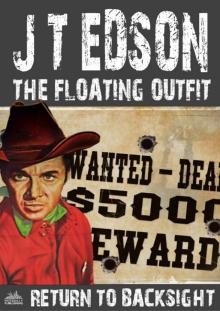 The Floating Outfit 61
The Floating Outfit 61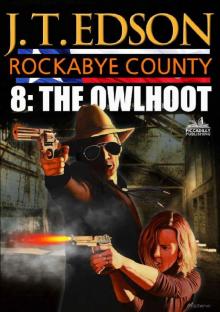 The Owlhoot
The Owlhoot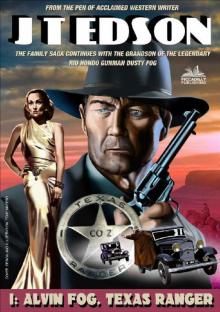 Alvin Fog, Texas Ranger
Alvin Fog, Texas Ranger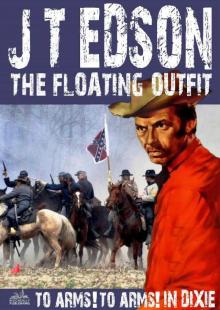 The Floating Outfit 34: To Arms! To Arms! In Dixie! (A Floating Outfit Western)
The Floating Outfit 34: To Arms! To Arms! In Dixie! (A Floating Outfit Western)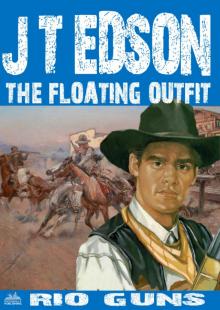 The Floating Outfit 44
The Floating Outfit 44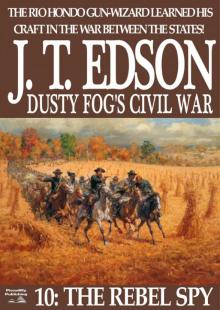 Dusty Fog's Civil War 10
Dusty Fog's Civil War 10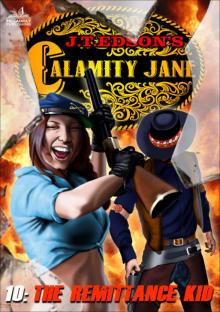 Calamity Jane 10
Calamity Jane 10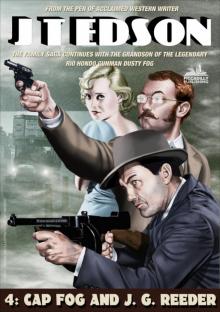 Cap Fog 4
Cap Fog 4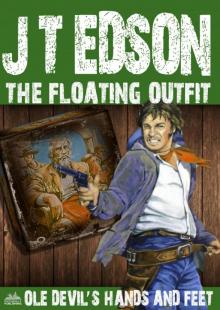 The Floating Outfit 51
The Floating Outfit 51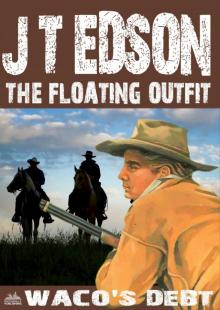 The Floating Outfit 50
The Floating Outfit 50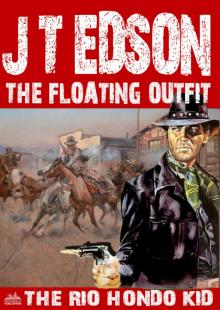 The Floating Outfit 49
The Floating Outfit 49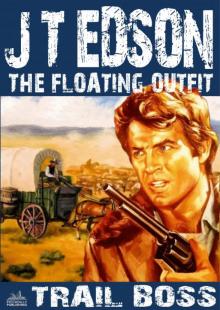 The Floating Outfit 10
The Floating Outfit 10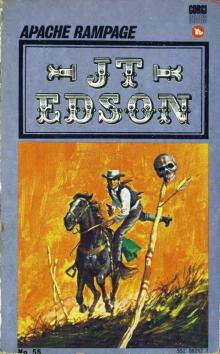 Apache Rampage
Apache Rampage The Floating Outfit 15
The Floating Outfit 15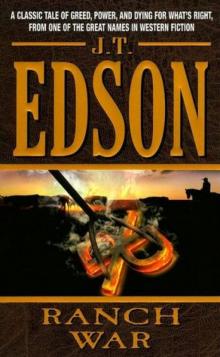 Ranch War
Ranch War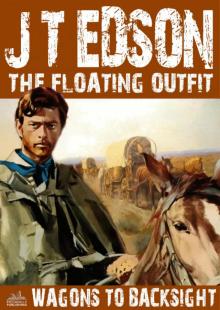 The Floating Outfit 11
The Floating Outfit 11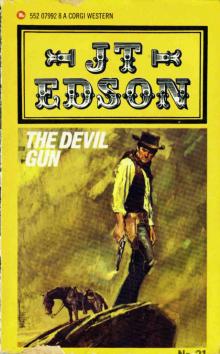 The Devil Gun
The Devil Gun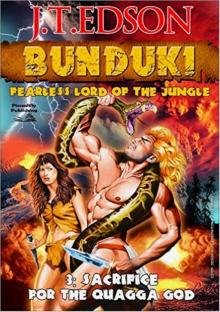 Sacrifice for the Quagga God (A Bunduki Jungle Adventure Book 3)
Sacrifice for the Quagga God (A Bunduki Jungle Adventure Book 3)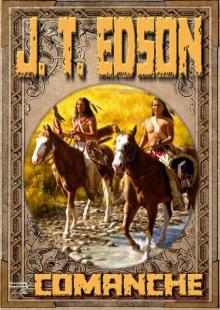 Comanche (A J.T. Edson Western Book 1)
Comanche (A J.T. Edson Western Book 1)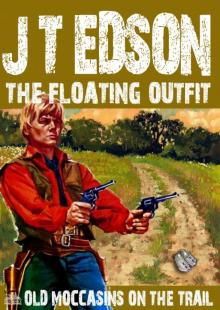 The Floating Outfit 48
The Floating Outfit 48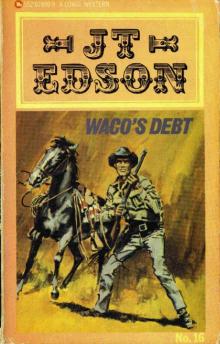 Wacos Debt
Wacos Debt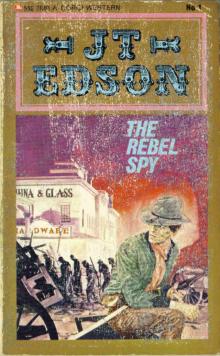 The Rebel Spy
The Rebel Spy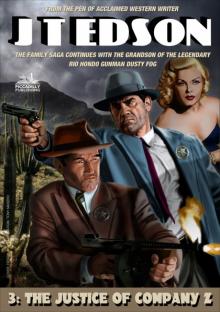 Cap Fog 3
Cap Fog 3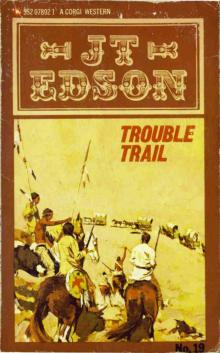 Trouble Trail
Trouble Trail Cold Deck, Hot Lead
Cold Deck, Hot Lead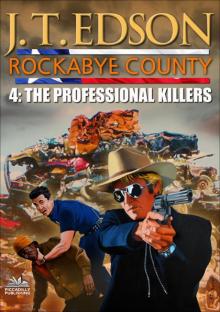 Rockabye County 4
Rockabye County 4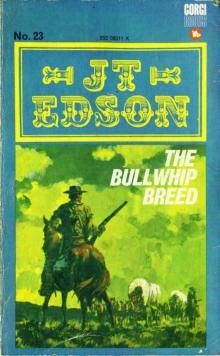 The Bullwhip Breed
The Bullwhip Breed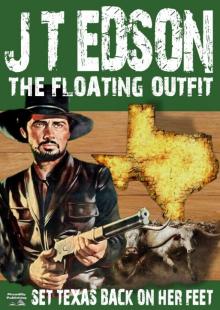 Set Texas Back On Her Feet (A Floating Outfit Western Book 6)
Set Texas Back On Her Feet (A Floating Outfit Western Book 6)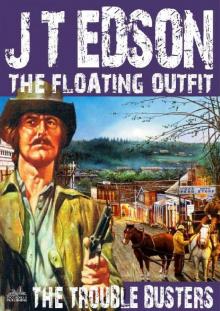 The Floating Outfit 25: The Trouble Busters (A Floating Outfit Western)
The Floating Outfit 25: The Trouble Busters (A Floating Outfit Western)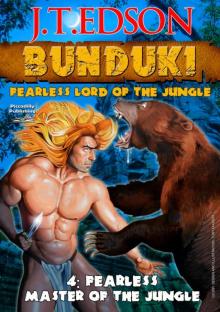 Fearless Master of the Jungle (A Bunduki Jungle Adventure
Fearless Master of the Jungle (A Bunduki Jungle Adventure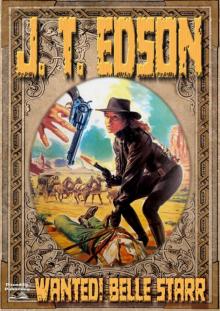 Wanted! Belle Starr!
Wanted! Belle Starr!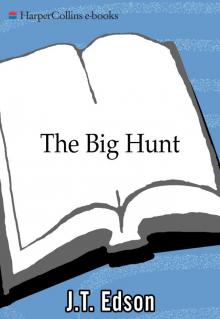 The Big Hunt
The Big Hunt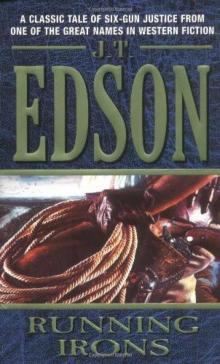 Running Irons
Running Irons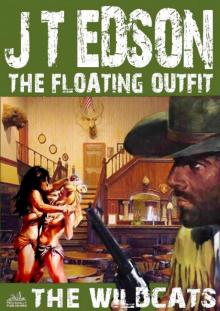 The Floating Outfit 19
The Floating Outfit 19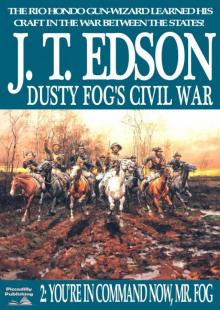 You're in Command Now, Mr Fog
You're in Command Now, Mr Fog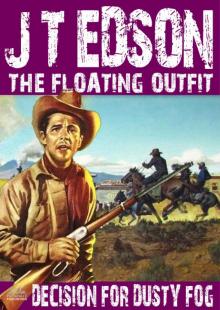 The Floating Outfit 27
The Floating Outfit 27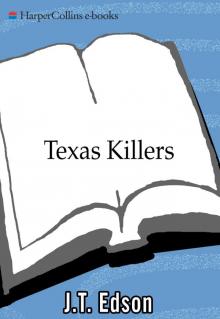 Texas Killers
Texas Killers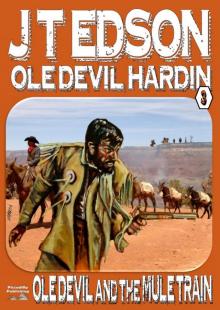 Ole Devil and the Mule Train (An Ole Devil Western Book 3)
Ole Devil and the Mule Train (An Ole Devil Western Book 3)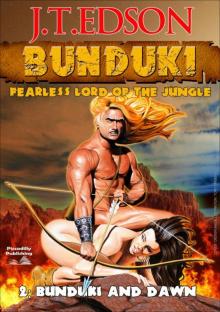 Bunduki and Dawn (A Bunduki Jungle Adventure Book 2)
Bunduki and Dawn (A Bunduki Jungle Adventure Book 2)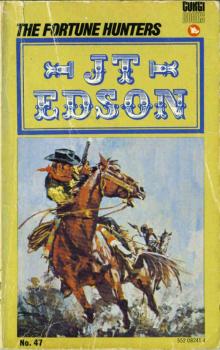 The Fortune Hunters
The Fortune Hunters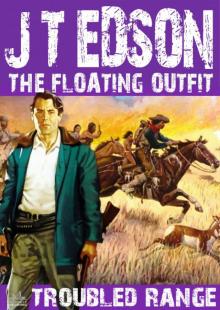 The Floating Outfit 12
The Floating Outfit 12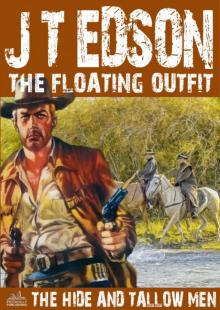 The Hide and Tallow Men (A Floating Outfit Western. Book 7)
The Hide and Tallow Men (A Floating Outfit Western. Book 7)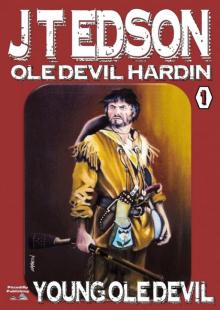 Young Ole Devil
Young Ole Devil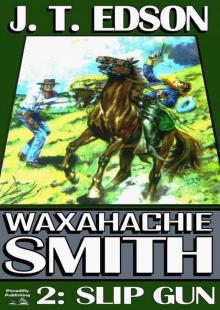 Slip Gun
Slip Gun The Drifter
The Drifter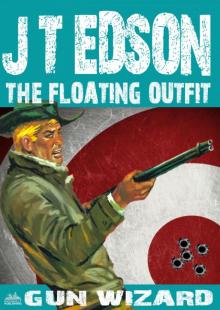 The Floating Outfit 45
The Floating Outfit 45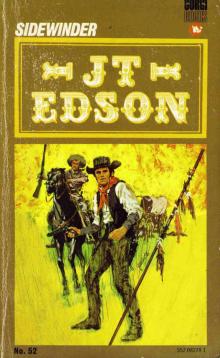 Sidewinder
Sidewinder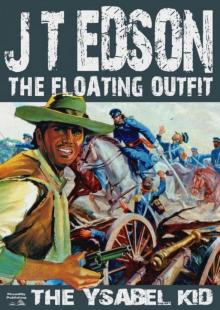 The Ysabel Kid
The Ysabel Kid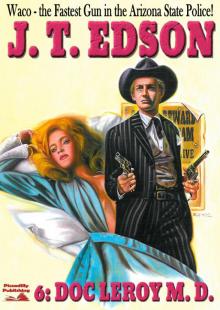 Waco 6
Waco 6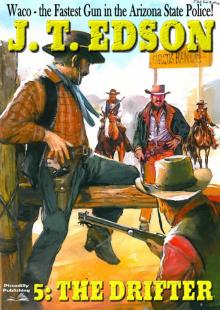 Waco 5
Waco 5 Point of Contact
Point of Contact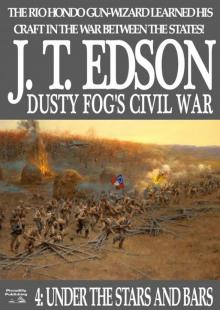 Under the Stars and Bars (A Dusty Fog Civil War Western Book 4)
Under the Stars and Bars (A Dusty Fog Civil War Western Book 4)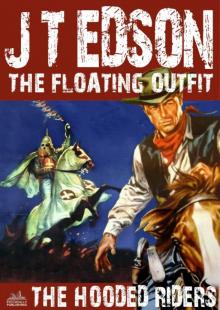 The Floating Outfit 9
The Floating Outfit 9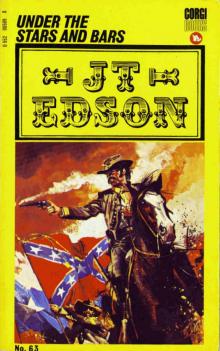 Under the Stars and Bars
Under the Stars and Bars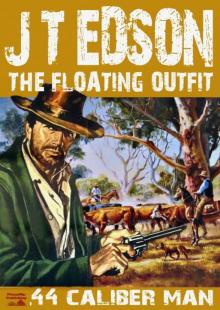 .44 Caliber Man
.44 Caliber Man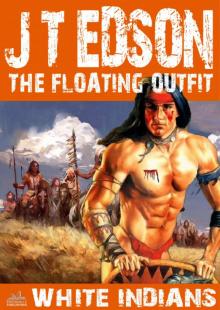 The Floating Outfit 17
The Floating Outfit 17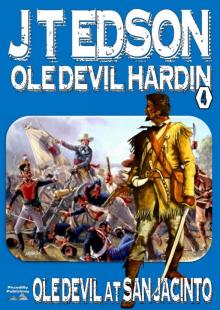 Ole Devil at San Jacinto (Old Devil Hardin Western Book 4)
Ole Devil at San Jacinto (Old Devil Hardin Western Book 4)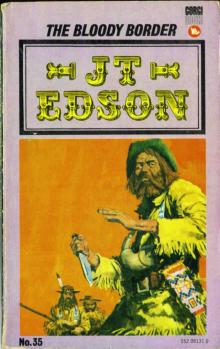 The Bloody Border
The Bloody Border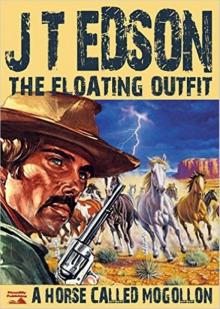 A Horse Called Mogollon (Floating Outfit Book 3)
A Horse Called Mogollon (Floating Outfit Book 3)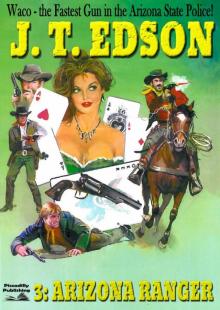 Waco 3
Waco 3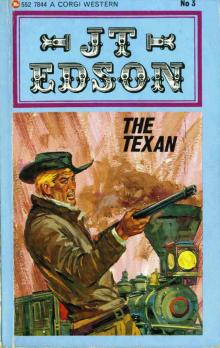 The Texan
The Texan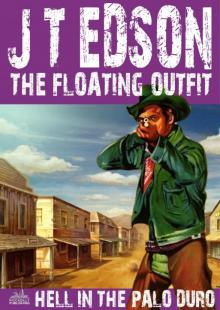 The Floating Outfit 35
The Floating Outfit 35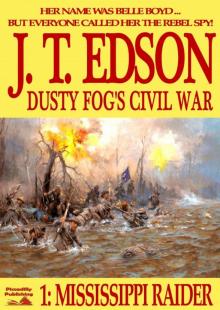 Mississippi Raider
Mississippi Raider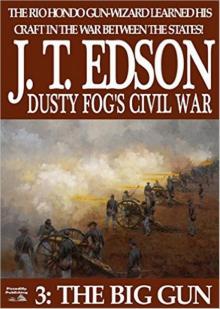 The Big Gun (Dusty Fog's Civil War Book 3)
The Big Gun (Dusty Fog's Civil War Book 3)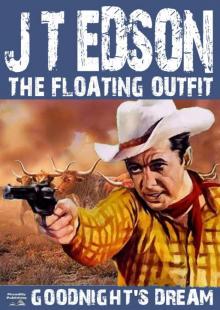 Goodnight's Dream (A Floating Outfit Western Book 4)
Goodnight's Dream (A Floating Outfit Western Book 4) Waco 4
Waco 4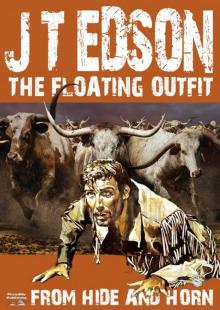 From Hide and Horn (A Floating Outfit Book Number 5)
From Hide and Horn (A Floating Outfit Book Number 5)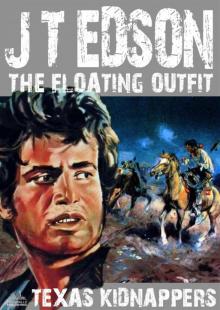 The Floating Outfit 18
The Floating Outfit 18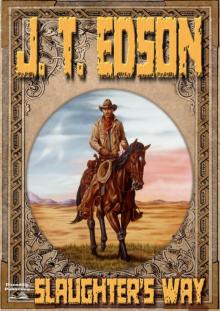 Slaughter's Way (A J.T. Edson Western)
Slaughter's Way (A J.T. Edson Western)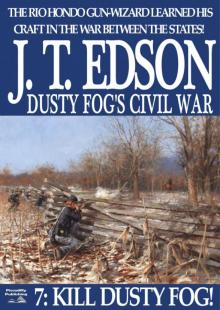 Dusty Fog's Civil War 7
Dusty Fog's Civil War 7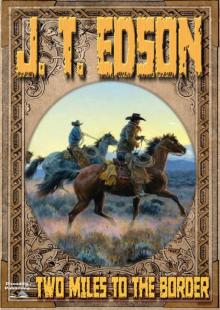 Two Miles to the Border (A J.T. Edson Western)
Two Miles to the Border (A J.T. Edson Western)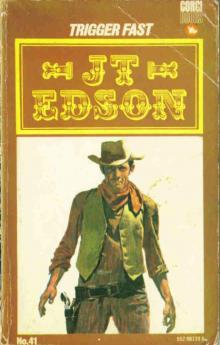 Trigger Fast
Trigger Fast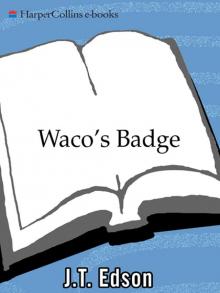 Waco's Badge
Waco's Badge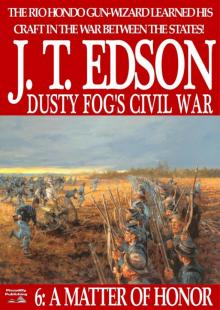 A Matter of Honor (Dusty Fog Civil War Book 6)
A Matter of Honor (Dusty Fog Civil War Book 6)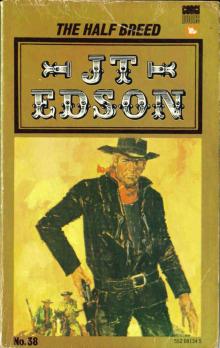 The Half Breed
The Half Breed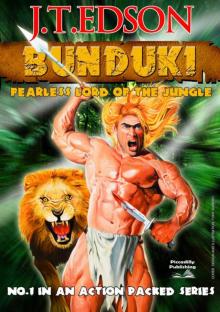 Bunduki (Bunduki Series Book One)
Bunduki (Bunduki Series Book One)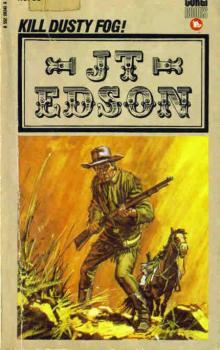 Kill Dusty Fog
Kill Dusty Fog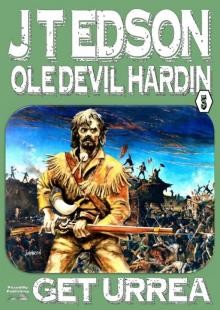 Get Urrea! (An Ole Devil Hardin Western Book 5)
Get Urrea! (An Ole Devil Hardin Western Book 5)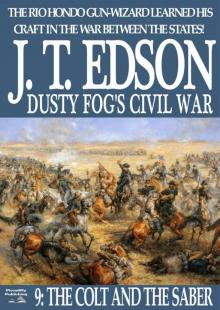 Dusty Fog's Civil War 9
Dusty Fog's Civil War 9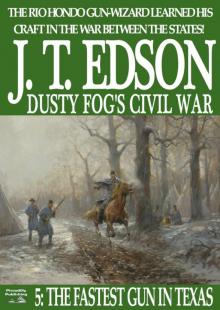 The Fastest Gun in Texas (A Dusty Fog Civil War Book 5)
The Fastest Gun in Texas (A Dusty Fog Civil War Book 5)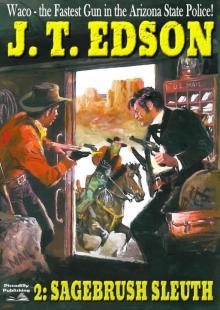 Sagebrush Sleuth (A Waco Western #2)
Sagebrush Sleuth (A Waco Western #2)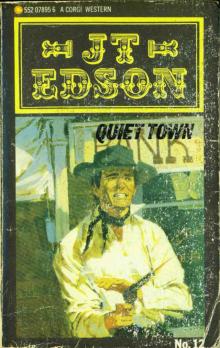 Quiet Town
Quiet Town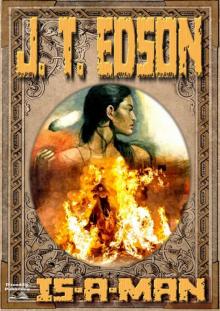 Is-A-Man (A J.T. Edson Standalone Western)
Is-A-Man (A J.T. Edson Standalone Western)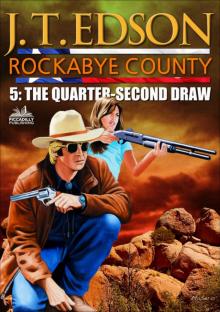 Rockabye County 5
Rockabye County 5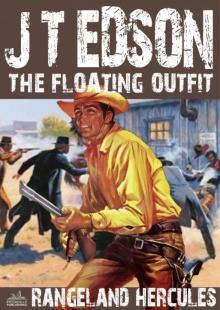 The Floating Outfit 14
The Floating Outfit 14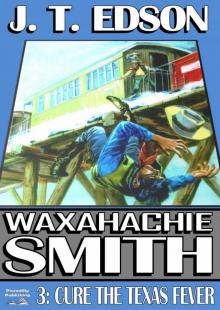 Cure the Texas Fever (A Waxahachie Smith Western--Book 3)
Cure the Texas Fever (A Waxahachie Smith Western--Book 3)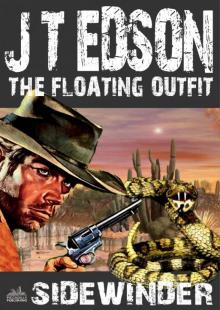 The Floating Outfit 13
The Floating Outfit 13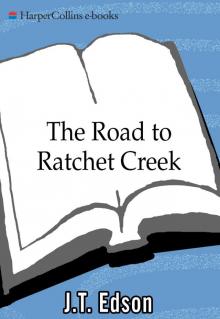 The Road to Ratchet Creek
The Road to Ratchet Creek